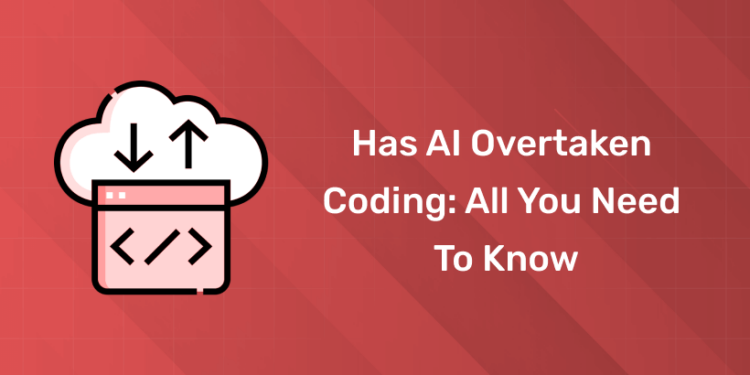Table of Contents
Artificial intelligence, or AI, has been slowly taking over the world for some time now. While many aspects of everyday life are already automated, AI has always shied away from one area in particular—coding. While coders have traditionally been responsible for developing new apps and maintaining old ones, recent advances in AI seem to be putting that responsibility on the shoulders of AI instead. Has AI overtaken coding? Is there still room in the world for good old-fashioned human coders? And what does this mean for our future as technology progresses.
Experience the power of our machine learning course with a free demo – Enroll Now!
What Is Artificial Intelligence?
Artificial intelligence is a fairly new technology that allows programmers to create intelligent machines. But it’s an imprecise science, and there is no real consensus on how to define it. Is it when a computer can beat a human at chess, as IBM’s Deep Blue did in 1997? Or is it when a machine can perform tasks that are currently performed by humans, such as flying an airplane or diagnosing disease, even if we still need humans to program what those tasks are and supervise their execution? Then there are things like voice recognition (does Siri count?), which you could argue is artificial intelligence without any actual intelligence at all.
The Role of AI in Coding
1: Which of the following algorithms is most suitable for classification tasks?
AI’s involvement in coding primarily revolves around automating repetitive tasks, enhancing productivity, and even generating code snippets. Here are some key areas where AI is making a difference:
- Code Generation: Tools like OpenAI’s Codex, which powers GitHub Copilot, can generate code snippets based on natural language prompts. These tools can significantly speed up development by providing boilerplate code or even complex functions.
- Bug Detection and Fixing: AI can assist in identifying bugs and suggesting fixes. Platforms like DeepCode and Snyk use AI to analyze code and detect vulnerabilities, ensuring more secure and reliable software.
- Code Optimization: AI can analyze code for inefficiencies and suggest optimizations. This helps in creating faster and more efficient software.
- Automating Testing: AI-driven testing tools can automatically generate test cases, execute tests, and report bugs. This reduces the manual effort required in the testing phase and increases test coverage.
🚀 Start Coding Today! Enroll Now with Easy EMI Options. 💳✨
Equip yourself with in-demand skills to land top-tier roles in the data-driven world.
Start Learning Now with EMI OptionsCapabilities of AI in Coding
AI has shown impressive capabilities in various coding-related tasks:
- Natural Language Processing (NLP): AI can understand and generate code from natural language descriptions, making it easier for non-programmers to create software.
- Pattern Recognition: AI excels at recognizing patterns in code, which is useful for tasks like code completion and predicting the next lines of code.
- Learning from Large Datasets: AI models trained on vast amounts of code from repositories like GitHub can provide solutions and suggestions based on a wide array of coding practices and styles.
When Can We Say AI Has Replaced Coding?
Before artificial intelligence is fully capable of doing everything that humans can do, you may hear some people say that computers can replace coders. In reality, although coding (or programming) isn’t what we traditionally think of as artificial intelligence, it is still an essential part of developing computer systems. It will be a while before artificial intelligence programs can perform every aspect of computer programming without human intervention, and even longer before they are even close to replacing all software engineers. That said, with research in both AIs and programming progressing rapidly—and more companies turning to AI solutions like virtual assistants instead of hiring more full-time employees—the day when bots replace coders could come sooner than most people think.
What Is Machine Learning and How Does It Work?
Machine learning is an artificial intelligence (AI) technique that gives computers systems the ability to learn without being explicitly programmed. Machine learning can be used in a variety of applications from spam filtering to targeted marketing, but in all cases, it uses pattern recognition and data analysis. Machine learning systems also use algorithms, which are sets of rules for solving a specific problem or completing a specific task. These algorithms are constantly evolving, so you need to keep up with new developments.
Limitations of AI in Coding
Despite its advancements, AI is not yet ready to replace human coders entirely. Here are some limitations:
- Context Understanding: AI often struggles with understanding the broader context of a project. It can generate code snippets but might not grasp the overall architecture or design goals.
- Creativity and Problem-Solving: While AI can assist with repetitive tasks and generate standard code, it lacks the creativity and critical thinking required for solving complex and unique problems.
- Debugging Complex Issues: AI tools can identify common bugs, but they often fall short when dealing with intricate, multi-layered issues that require deep understanding and insight.
- Ethical and Security Concerns: AI-generated code can sometimes include insecure practices or biased algorithms, leading to ethical and security issues.
🚀 Start Coding Today! Enroll Now with Easy EMI Options. 💳✨
Equip yourself with in-demand skills to land top-tier roles in the data-driven world.
Start Learning Now with EMI OptionsIs Learning New Skills Necessary In The Future with Artificial Intelligence?
In a word, yes. Artificial intelligence may take over simple programming and design tasks, but those that want to succeed in a world with machines at their side will need to learn new skills. The good news is it’s easier than ever to learn. We live in an age where new technologies are born every day, allowing everyone—even those without programming or design skills—to pick up new skills without spending money on books and courses. With that said, some of these tools aren’t right for everyone.
The Benefits of Learning New Skills
The notion that technology advances so quickly makes it seem like if you’re not constantly up-skilling, you’ll be left behind. It’s difficult to argue with that logic. The day I had to say goodbye to my first cell phone was heartbreaking. But is that same thinking true for skills like coding? In many ways, it depends on what type of job you want. But no matter your career goals, keeping your mind nimble and open to new experiences can make you happier in your work, more successful in life, and even healthier in the body. If you are interested to build your career in artificial intelligence, the Entri App will help you. Here we are providing a structural study plan so that you can learn the new skills easily. To know more about the courses we provide, download the Entri app from the play store and explore the benefits.
Experience the power of our machine learning course with a free demo – Enroll Now!
The Future of AI in Coding
AI’s role in coding is likely to grow, but rather than replacing human programmers, it will augment their capabilities. Here are some potential future trends:
- Enhanced Collaboration: AI will continue to serve as a collaborative tool, helping developers by automating mundane tasks and allowing them to focus on more strategic aspects of software development.
- Personalized Learning: AI-driven platforms could provide personalized learning experiences for developers, suggesting resources and tutorials based on their coding habits and skill











